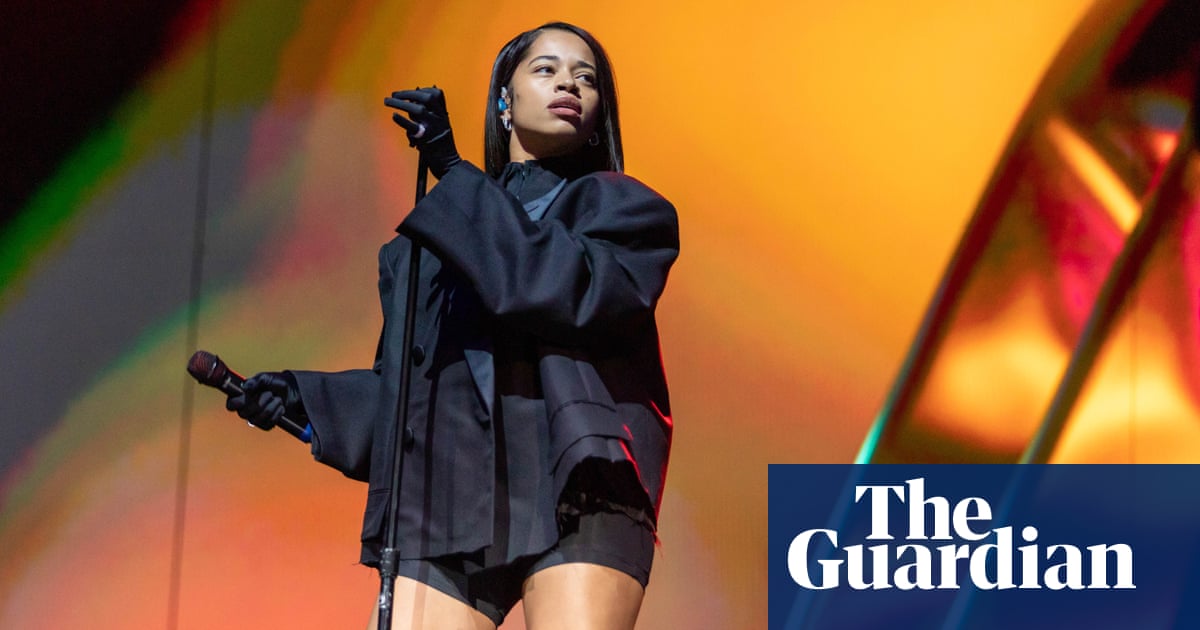
hrough soul, funk, disco and beyond, black female vocalists stood proudly on the front of record sleeves and on stages. Then, in 1989, Italian dance group Black Box released their No 1 hit Ride on Time. Its powerhouse vocal hook was sampled from Loleatta Holloway’s 1980 hit Love Sensation, but in the credits, video and artwork, neither Holloway, nor the vocalist they later had re-record the sample, was anywhere to be found, while a different woman entirely mimed to the song on Top of the Pops.
The following year, US outfit C+C Music Factory released Gonna Make You Sweat (Everybody Dance Now), again with a strong soul vocal, courtesy of Martha Wash of the Weather Girls. Her name was also absent.
This damaging trend has persisted and examples are numerous. Finally by Kings of Tomorrow, At Night by Shakedown, 17 by MK – pop-dance anthems such as these are played constantly and the vocals are the core of their success, but you wouldn’t know the black women who sing them.
House producer Funk Butcher recently tweeted: “Shall we talk about black female vocalists on house music tracks used for authenticity but never making the visuals for the marketed video or worse yet credited as the featuring act?!”, the ensuing thread was retweeted by BBC Radio 1’s Annie Mac and caught the attention of singer-songwriter Kelli-Leigh. “When I saw that tweet, I started speaking about my experiences,” she says, “and other black and mixed-race women thanked me for speaking out. It’s happened for so many years.”
Kelli-Leigh sang vocals on two UK No 1 singles, both uncredited: I Got U by Duke Dumont and Jax Jones, and I Wanna Feel by Secondcity. “It’s strange when your voice is on the record but you’re not revered in the same way as the producer,” she says. She spoke to Michelle Escoffery, co-writer and credited vocalist for Think About Me by Artful Dodger, who also wrote the Ivor Novello-winning No 1 single Just a Little by Liberty X. The pair have assembled a group of uncredited singers who say it’s time that their contributions are acknowledged – and paid for. A mix tape featuring new versions of their songs is being released this month.
One artist on that tape whose voice was undervalued in every sense is Shingai Shoniwa, lead singer of Noisettes, now recording solo as Shingai. She sang Dennis Ferrer’s Ibiza smash Hey Hey in 2009 – the same year Noisettes reached No 2 with Don’t Upset the Rhythm (Go Baby Go) – but her vocals went uncredited, earning her only a few hundred pounds and resistance from her label. “They didn’t want me competing against myself,” she says.
Many of these women have tried to forge independent careers as solo singers, but it can be difficult to make that leap. “When your voice is in high demand, it’s hard to choose between wanting to be a solo artist or getting paid,” says Laura, a singer who asked us not to use her real name. “You don’t get the same recognition despite singing the hook – it can be frustrating when you’ve jumped that hurdle of actually being credited, but radio presenters just say the producer’s name. I didn’t get to go on Top of the Pops when the track I sang on was played, so I had to make sure they featured my name in a caption.” Without that acknowledgment, audiences don’t have a name to latch on to, and a solo career becomes harder.
This has a negative financial impact, not only for future opportunities, but also long after a song has been released. Laura says that because she was unsure of how the industry worked, she wasn’t registered as a performer on the hit track she featured on in 2000, so she lost out on royalties she is still trying to recoup. “To this day, I get [royalties company] PPL asking why I’m not registered on my biggest track, which is more than 20 years old,” Laura says. “If you aren’t listed on PPL, you won’t get the same money. Seeing how well the producer does off a song and I don’t make the same amount – it’s hard.” Shingai believes industry paperwork has held her back, too. “I’m still fighting publishers and record labels for the rights to music that I wrote when I was 16 – that’s 20 years ago.”
Kelli-Leigh says she was hired as a session singer, and “didn’t understand the wider impact financially should the songs do well. Being credited was never mentioned to me as an option and wasn’t something I knew about until after the records had become hits. Now I’m a lot wiser to the industry however a lot of singers are still being taken advantage of in this way, shamefully.”
For Escoffery, this is where her wealth of experience comes in. “Our job now is to educate young singers and songwriters on their rights so that they can avoid being exploited. You won’t know unless someone tells you. My tip would be to read, read, read! Inform yourself of other writers’ and singers’ stories – their pitfalls and victories. Learn about copyright, rights control and social media marketing. Most importantly though, trust your gut – if something feels off, it normally is.”
Elisabeth Troy’s gut felt fine when working with producers such as MJ Cole – she sang on his Top 10 UK garage hit Crazy Love in 2000. But then the industry started to silence artists. “MJ Cole was doing an apprenticeship at the label I was signed to,” she says. “He was such a lovely guy and he brought me in on his album when he got a record deal. It was around that time that things started to get more producer-led rather than artist-led, which was odd for me as I grew up listening to artists such as Diana Ross” – in other words, women who would be the main credited artist. When Crazy Love was released, Troy wasn’t even credited as “featuring” (though is now named on the track on streaming services). “It seems like some record labels try to devalue the singer, which really isn’t always the fault of the producer,” she says.
Laura says this is partly down to black singers being pigeonholed. “I always hear: ‘We love what you do, but don’t know how to market it,’” she says. “Even though they know how to market everything else. They have cultivated this idea that people who buy records want to idolise someone that looks like them, so this narrative has been pushed that black women don’t sell records, as the majority of the country don’t look like us.” The awards and chart placings of course, show that it is black women selling these records, however unaware the audience are of it.
For Kelli-Leigh, too, the categorisation of music has made it harder for certain singers to reach a mainstream audience; labels, it seems, are unwilling to push black women as pop stars, rather than as rappers or R&B singers. “While my voice is soulful, I don’t think that it would fit into the category of R&B,” she says. “But it’s very easy for black women to be put in this category. A lot of these women are perfectly marketable and look like pop stars – we have some amazing talent in the UK – but we’re just not championing our own.”
Escoffery points to the phenomenon of black British female singers going to the US and cultivating a fanbase there. “It wasn’t until Estelle went Stateside that she blew up,” she says. Shingai says Noisettes were only signed in the UK after Motown signed them in the US. But Escoffery argues that “we don’t want all of our talent to be exported” and that the US has its own stereotyping problems: “I’m a pop writer but people always assumed that I wasn’t. When I went to America, being British, I felt I had to prove that I was black enough to write R&B. I didn’t know where I sat, so it was difficult to find my space.”
Laura believes that these assumptions have been exacerbated by colourism, with white or lighter-skinned singers taking space from darker-skinned singers. Vocalists such as Becky Hill, Raye and Ella Eyre have been credited alongside their male producers and made the jump to fronting their own tracks, while darker-skinned singers, such as Laura and Shingai, haven’t. Also, think of the biggest UK female pop stars of recent years, who are all white or mixed race: Dua Lipa, Little Mix, Jess Glynne, Mabel, Anne-Marie.
“There’s a clear pattern with a lot of dance music, I’ve found,” Shingai suggests. “With acts such as Rudimental or Sigala, it’s been those tracks with vocals from white or mixed race singers that have really blown up, despite them also working with a lot of super talented darker-skinned singers on album tracks.” She believes that when black singers do get an opportunity, “it’s a one-in one-out situation. I’ve been told that because there’s a Ray BLK or Laura Mvula album coming out, my album can’t be pushed. It affects your self-esteem as a black artist – there’s something quite rotten at the core of the music industry.”
With all of this said, the recent support for the Black Lives Matter movement by the music industry, and the creation of the Black Music Coalition – a group of black British music executives demanding initiatives such as mandatory bias training – suggests that change might come. There are a few key changes that these women would like to see. “Greater equality and opportunity for women like us,” Kelli-Leigh says. “I’d love more investment from labels and radio, and to see these women signed more often – or greater appreciation given to those who are working independently.”
Without always knowing, we’ve been hearing these women’s voices for years. Now it’s time to actually listen.
• Shingai’s debut album Life, Sound and Dimensions, is due for release in September.












